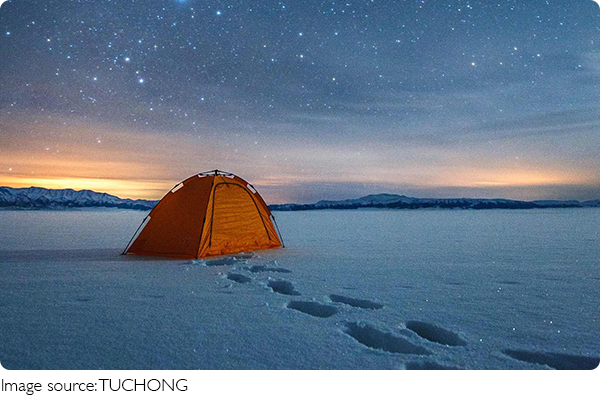Wild Camping in Europe

Wild camping, or camping outside established sites, is a unique way to connect with nature. It allows individuals to pitch a tent in the wilderness, far from urban areas, and spend a night under the stars.
However, this practice is not universally permitted across Europe.
While some countries embrace this outdoor lifestyle, others impose strict regulations or outright ban it. The rules can vary from region to region, and understanding these distinctions is crucial for travelers seeking to enjoy the freedom of wild camping.

Countries Where Wild Camping Is Allowed
Several European countries stand out as champions of wild camping, providing ample space for outdoor enthusiasts to enjoy nature. Among the most popular destinations for wild camping are Sweden, Norway, Finland, and Scotland, where the practice is widely accepted.
Rules for Wild Camping
While wild camping is allowed in these countries, it's important to follow some basic guidelines to protect nature and maintain a responsible camping experience. Here are some key principles to follow:
- Always choose a suitable and safe spot for setting up camp.
- Avoid disturbing wildlife by keeping noise levels to a minimum.
- Leave no trace by cleaning up and removing all trash.
- Refrain from starting fires, as this can harm the environment and disturb animals.
Wild Camping Overview in Various European Countries
It’s essential to note that the regulations regarding wild camping can change frequently, and different regions may have their own specific rules. It is always best to check local guidelines before setting up camp.

Country-Specific Regulations
Here is a breakdown of the wild camping regulations in several European countries:
- **Albania**: Wild camping is allowed without significant restrictions.
- **Austria**: Wild camping is generally prohibited, although there is no national regulation.
- **Belgium**: Wild camping is largely prohibited.
- **Bosnia and Herzegovina**: Wild camping is largely prohibited.
- **Bulgaria**: Wild camping is largely prohibited.
- **Croatia**: Wild camping is largely prohibited.
- **Denmark**: Wild camping is largely prohibited, though special areas for camping in nature are available.
- **Estonia**: Wild camping is allowed.
- **Finland**: Wild camping is permitted, but certain conditions apply.
- **France**: Wild camping is largely prohibited.
- **Germany**: Wild camping is generally prohibited, although there is no uniform regulation nationwide.
- **United Kingdom**: Wild camping is largely prohibited.
- **Greece**: Wild camping is largely prohibited.
- **Ireland**: Wild camping is largely prohibited.
- **Iceland**: Wild camping is largely prohibited.
- **Italy**: Wild camping is largely prohibited.
- **Latvia**: Wild camping is allowed.
- **Lithuania**: Wild camping is allowed.
- **Luxembourg**: Wild camping is largely prohibited.
- **North Macedonia**: Wild camping is largely prohibited.
- **Moldova**: Wild camping is permitted.
- **Montenegro**: Wild camping is largely prohibited.
- **Norway**: Wild camping is permitted for a maximum of two nights.

- **Netherlands**: Wild camping is largely prohibited.
- **Poland**: Wild camping is largely prohibited.
- **Portugal**: Wild camping is largely prohibited.
- **Czech Republic**: Wild camping is largely prohibited.
- **Romania**: Wild camping is permitted, but not recommended.
- **Serbia**: Wild camping is largely prohibited.
- **Slovenia**: Wild camping is largely prohibited.
- **Spain**: Wild camping is largely prohibited.
- **Sweden**: Wild camping is allowed everywhere.
- **Switzerland**: Wild camping is not generally prohibited, though there is no uniform regulation nationwide.
- **Hungary**: Wild camping is largely prohibited.

Conclusion
Wild camping offers a unique opportunity to immerse oneself in nature, away from the constraints of established campsites. However, the freedom to camp without restrictions is not universal across Europe. While countries like Sweden, Norway, Finland, and Scotland embrace this outdoor tradition, others, such as France, Spain, and Italy, have strict regulations in place.
It’s important to research local guidelines and always camp responsibly, ensuring that nature remains undisturbed and that future generations can enjoy these wild spaces as much as the current ones.
-
 Glass Jar ObsessionWhy I Replaced Every Plastic Container with a Glass Jar—And Honestly, I Should’ve Done It Sooner!
Glass Jar ObsessionWhy I Replaced Every Plastic Container with a Glass Jar—And Honestly, I Should’ve Done It Sooner! -
 Skiing in RomaniaDiscover Romania’s Hidden Skiing Paradise – Where Adventure Meets Tranquility!
Skiing in RomaniaDiscover Romania’s Hidden Skiing Paradise – Where Adventure Meets Tranquility! -
 Dessert recipesThese desserts and drinks are not only refreshing and delicious, but they’re also easy to make!
Dessert recipesThese desserts and drinks are not only refreshing and delicious, but they’re also easy to make!